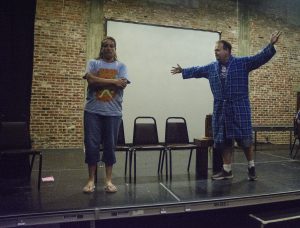Theatre Oxford’s production of “Brighton Beach Memoirs” brings Neil Simon’s classic to life, and despite some moments of missed opportunities, it manages to compel and move viewers.
For those unfamiliar with the show, it follows a short period in the life of Eugene, a young man growing up in 1930s Brooklyn with his brother, parents, aunt and two cousins.
Eugene nods playfully to the audience in the beginning of the show and shares his plans to write his life story down as a novel or a play. Thus, “Brighton Beach Memoirs” was born.

Jaime Adams and Geoff Knight practice a scene from Brighton Beach Memoirs during rehearsal at the Powerhouse on Tuesday. (Photo by Marlee Crawford)
As cliché as that trope may be now, Theatre Oxford’s cast manages to give new life to the show, keeping up a vibrant energy that engages the audience and keeps it from looking too closely at the somewhat-dated storyline.
The set is quaint and minimalistic, and while the walls and furniture may seem slightly bland at times, this show makes up for it with the excellent use of space and levels to create dramatic tension and variety. The design team manages to imply two bedrooms and a bathroom on a second floor simply through clever pantomimes and creative flat placements.
Few theaters in the South can really take advantage of the physical design of their building to complement the set and time period of a show, but the Powerhouse makes full use of the aging brick walls and intimate space to draw you in to the world of Brighton Beach, circa 1937.
There were several standout performances throughout the night, notably from Theatre Oxford regulars Jaime Adams (Kate), Joshua Heylin (Stanley) and Jacob Hall (Eugene).
Adams plays the irritable, hard-working, family-minded housewife with a charm and technique that outshines most of the other performers on stage. Her pain and sadness are visible in her eyes. Her moments of anger make me think back on times in my childhood when my mother scolded me. Her performance brings a liberal dash of realism and emotion to the show.
Joshua Heylin also gives an impressive, albeit a bit stiff at times, performance. His charm and expressiveness draw audiences in almost immediately, and his larger-than-life comedic moments won’t fail to make viewers laugh.
But one of the most notable performances of the night came from Jacob Hall’s rendition of Eugene. Hall manages the difficult task of not only carrying the majority of the play but also capturing Neil Simon’s deadpan comedic line delivery. His ability to connect and engage with the audience is impressive, and while he misses some comedic opportunities occasionally, he is quick on his feet and recovers well.
Both Heylin and Hall portray the brothers, Stanley and Eugene, in a natural, entertaining way. One might assume they are actually brothers just based on the energy and back-and-forth banter they so cooly deliver.
Taylor Bradley and Grace Wolff, who play the roles of Laurie and Nora, both deliver performances that are impressive for their age.
Bradley has several shining moments of deadpan humor, which make up for some lines that were rushed over or not quite loud enough to hear. Her ability to portray an indifferent younger sister who constantly insults her older counterpart will make you smile as you think about childhood memories with your siblings.
Wolff also gives a humorous – if a bit melodramatic – rendition of Nora. The line between angst-ridden teenage drama queen and pure melodrama was crossed occasionally, but her emotional outburst in Act Two will stop you in your tracks as she displays the kind of authentic, realistic reactions you’d expect from a hurting teenager trying to pursue her dreams.
Geoff Knight, who plays Jack, gives a convincing performance as the dejected, overworked and frustrated father of kids who can’t seem to leave him alone for a minute of peace. And Susan Bradley, who plays Blanche, also provides a good amount of dramatic tension as the down-on-her-luck aunt trying to make the most of life and move on from the troubles she’s seen.
The director, Kayleigh Graham, does an excellent job keeping her actors busy yet natural-looking onstage, which is necessary, as most of the actors are visible somewhere onstage most of the show.
The pacing is quick, and the energy is high from the beginning, which keeps this two-and-a-half hour show from feeling sluggish or draining.
Overall, the production captures the beauty of community theater – combining the talents of long-time performers with the enthusiasm of young recruits new to the stage.
At $15, the price is higher than you might expect for a community theater show, but it’s worth taking a chance on, especially if you enjoy the conversational wittiness of Neil Simon.
I give this show a B+. It’s plagued with some bumpy moments and comedic bits that fail to land, but it more than makes up for it in charm, strong character choices and excellent storytelling.






